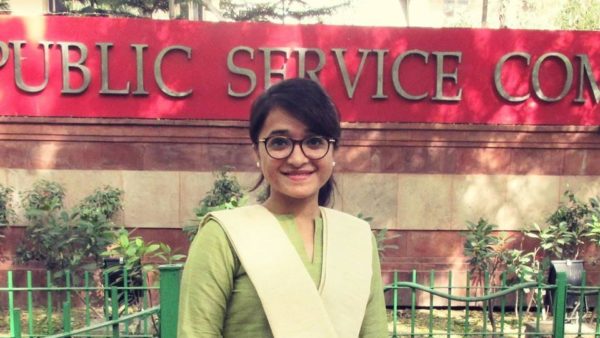As someone living with fragile bone disorder since she was a kid, odds were always against Ummul Kher. When she was 14, her parents disowned her because she wanted to study beyond Class 8. What took her ahead was sheer merit and determination as she went on to get admission in a prestigious Delhi University college and later entered JNU for her master’s. This week she cracked the civil services exam in her first attempt.
Ummul Kher, 28, got all India rank 420. She now hopes to get IAS under disability quota.
Kher, who has received 16 fractures and eight surgeries due to her disease, came to Delhi from Rajasthan when she was around five years old. Her father then worked as street vendor selling clothes near Hazrat Nizamuddin while the family lived in a nearby slum.
Kher took admission in Pt Deendayal Upadhyaya Institute for The Physically Handicapped, where she studies till Class 5. She later went to Amar Jyoti Charitable Trust where she studied till Class 8.
“It was a charitable organisation run by the government and I didn’t have to pay anything. Though getting one square meal was difficult, I was satisfied that I could at least study,” she said.
Life was difficult, but what came after that was “both difficult and painful” as Kher puts it.
“I wanted to study at Arwachin Bharti Bhawan senior secondary school as it had better infrastructure and I had got a scholarship,” she said. But her parents were against it. They said that if she studied any further they will sever ties with her. “I was abused. My intentions were questioned because I wanted to study. It was the worst time. They said you have now got more education than a girl should,” she said.
She left home and took up a place in Jhuggi Jhopri (JJ) Cluster, Trilokpuri, for which she paid out of the money she earned from tuitions — a decision she feels was more difficult than cracking the civil services exam.
“I had started taking tuitions but living independently meant I had to earn more money. From few children the tuitions expanded to four batches — 3pm to 5pm, then from 5pm to 7pm, 7pm to 9pm and 9pm to 11 in the night. These were mostly children from slum areas and I got between Rs 50-100 from each student. I couldn’t have expected more as these were children of labourers, iron smith, rickshaw-pullers etc,” she added.
“Besides, for a girl to live alone in a jhuggi was sometimes traumatic. It was never safe but I had no choice,” she said.
Sehnag Begum, who lives in Trilokpuri where Kher lived for around three years said, “She is a brave child. She lived alone but my daughter used to sleep with her because it is not safe for a girl to live alone.” In return, Kher gave her free tuitions, Begum said.
After Class 8, Kher’s education was backed by Amar Jyoti Charitable Trust. They helped her as and when required and also financed her tuition for Class 9 and 10.
Kher scored 91% in Class 12 and got admission in Gargi College where she continued to fund her education through tuitions. Kher’s friend from DU, Abhishek Ranjan, recalls her difficult college days, “She funded her education through the money she won at debates in DU colleges. You can earn decent money as the prize amount is high in some of the college festivals. But here too, she could not participate in debates that were organised in evening as she had to take tuitions,” he said.
In 2012, she met a small accident and was confined to a wheelchair for a year due to her bone disorder.
After finishing her graduation, Kher cleared JNU entrance exam for master’s in International Studies. She was now getting Rs 2,000 means-cum-merit scholarship and did not have to give tuitions. In 2013, she cracked the Junior Research Fellowship (JRF) under which she started getting Rs 25,000 per month.
Archna Upadhyay, a faculty member at JNU’s School of International Studies said the result was not surprising. “Despite her physical challenges she was always at a par with other students and excelled in both academics and extracurricular activities,” Upadhyay said.
Will she forgive her family for leaving her midway? “I don’t blame them. They were brought up in an environment that shaped their thinking. It is not their fault,” she said. “In the past two years, my relations with my family have improved. I will visit them soon.”
Her parents are now back in Rajasthan where her brother runs a small bangle shop.



Leave a reply